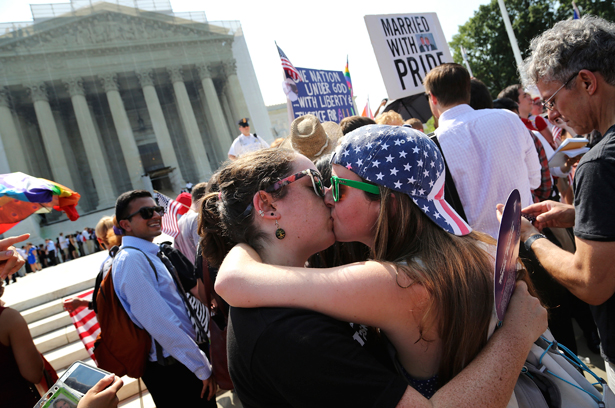
Sarah Beth Alcabes (L) kisses girlfriend Meghan Cleary, both of California, after the US Supreme Court’s ruling on cases against the federal Defense of Marriage Act (DOMA) and California’s gay marriage ban known as Prop 8, outside the court in Washington, June 26, 2013. (REUTERS/Jonathan Ernst)
There are 1,110 federal benefits, rights and obligations that, until last week, could only be claimed by heterosexual couples. That was clear until the Supreme Court struck down the Defense of Marriage Act in Windsor v. United States.
What’s not as clear is how many of those benefits can be quickly extended to same-sex couples. In particular, the Social Security Administration and the Department of Veterans Affairs have some thorny rules that may leave elderly couples and gay veterans in a legal no-man’s land for years to come.
“These two areas are of quite a bit of significance,” said Susan Sommer, the director of constitutional litigation at Lambda Legal, the country’s oldest gay-rights firm. Sommer noted that it’s too early to say exactly what options the executive branch has for extending VA and Social Security benefits to all same-sex spouses in spite of the statutes. “It may well be a different process and higher hurdles.”
The key problem is that gay marriages are legal in only thirteen states, and complicated residency rules vary from federal agency to federal agency.
For some agencies, the transition to post-DOMA benefits will be fairly straightforward: at the Defense Department, for example, there is a “place of celebration” rule, meaning that if a couple has a legal marriage license from any state, their union is valid regardless of the law where they live. Secretary of Defense Chuck Hagel already announced that the Pentagon “intends to make the same benefits available to all military spouses—regardless of sexual orientation—as soon as possible.”
Other federal agencies have a “place of residence” rule, which considers a marriage valid—and thus, spousal benefits valid—only if the union is recognized in the state where a couple lives.
For most agencies with a “place of residence” rule, same-sex benefits might take a little longer—but not by much. The administration has the authority to simply update or change agency rules independently, and President Obama has already directed the Justice Department to “ensure this decision, including its implications for Federal benefits and obligations, is implemented swiftly and smoothly.”
Popular
"swipe left below to view more authors"Swipe →
But the two exceptions are the VA and the Social Security Administration. Both use “place of residence” categorization—but both also have defined that in a statute. That means it will require an act of Congress to amend, and with the House of Representatives controlled by Republicans, that’s unlikely to materialize. (House Speaker John Boehner spent millions of federal dollars fighting to keep DOMA in place.)
Veterans’ spouses—those that are recognized—can access health care, take out a loan on favorable terms in order to buy, build or repair a home and be buried with their partner.
From the Social Security Administration, a retired spouse can collect disability and retirement benefits, a one-time sum after the death of a partner, and, if they were the lower earner, exchange their payment for the deceased’s higher allotment.
So, say two couples get legally married at the same courthouse in Washington, DC. One pair return to their home in the district, where they grow old and are ultimately eligible for the Social Security benefits millions of other American spouses depend on for support.
The second couple, meanwhile, drives across the Potomac to their home in Virginia, where they are not recognized as one another’s spouse and so are denied the very same privileges. It’s a nonsensical discrepancy. As Sommers put it, “Marriage should stick.”
“It’s quite possible that in order to get spousal benefits under these two programs to people who have valid marriage licenses but live in a state that doesn’t recognize them, we may have to see action by Congress,” said Brian Moulton, legal director at Human Rights Campaign. Beyond amending the individual statutes, legislation instituting a uniform law across agencies that recognizes all marriages in all states would solve the problem.
The Respect for Marriage Act, reintroduced in both the House and the Senate last week, does just that, but again the House is likely to remain a roadblock for passage.
In that case, Justice Department’s ability to find a way around the statutes is crucial. Advocates say it would be difficult to stop the agencies from extending benefits to same-sex spouses if they chose to do so.
In order to establish standing in any legal objection, “someone would need to be concretely injured by that action happening, and I’m not sure who that would be,” said Moulton. “But I do think some of our opponents are paying attention to how this moves.”
“The federal government has had to navigate all kinds of determinations of peoples’ status, including marital status, over the years and it has worked it out,” said Sommers. “People who do not qualify under the statutes…would face a tough choice between forgoing benefits or, if they could, moving. And I think it puts that much more pressure on states that continue to deny the freedom to marry to get into step with these principles of liberty and equality.”
Now that the Supreme Court has voted on DOMA, what’s next for the LGBT movement?


